

Co-writers Edgar Wright and Simon Pegg spoofed the zombie genre in the very funny Shaun of the Dead (2004). Here they've turned their sights on the popular Buddy Cop category (think Bad Boys, Lethal Weapon, etc). And they've delivered another very funny comedy, hilarious in sections.
As in Shaun of the Dead, Edgar Wright directs lead Simon Pegg, here playing Metropolitan Police Officer Nicholas Angel. Angel is a classic overachiever. He outperforms his colleagues; indeed, he has a 400% better arrest record than anyone. He is so good that he is making everyone else look bad. So, he is "promoted" to sergeant and sent away to the country, where he is no longer a problem for the London police.
 Partnered with Danny Butterman (Nick Frost, returning co-star from Shaun of the Dead), Nick finds Sandford, his new beat, a major change from London. With virtually no crime, this village has been "village of the year" for years. But soon accidents start to pile up. With a keen sense of "smell," Nick and Danny start to unravel a conspiracy.
Partnered with Danny Butterman (Nick Frost, returning co-star from Shaun of the Dead), Nick finds Sandford, his new beat, a major change from London. With virtually no crime, this village has been "village of the year" for years. But soon accidents start to pile up. With a keen sense of "smell," Nick and Danny start to unravel a conspiracy. The first act is a little slow, and there are numerous characters to introduce, including Danny's dad, Inspector Frank Butterman (Jim Broadbent, who asked for a part in Pegg's next movie after seeing Shaun), and smarmy supermarket owner Simon Skinner (Timothy Dalton, one-time James Bond). As the partnership between Danny and Nick develops, the comedy moves from first to second gear. At first they are the awkward odd couple, with Danny pestering Nick with oddball questions about police-work and guns: "Is it true that there's a point on a man's head where if you shoot it, it will blow up?" But as in buddy movies, this sets the scene for act 2, where the pair become real partners.
The first act is a little slow, and there are numerous characters to introduce, including Danny's dad, Inspector Frank Butterman (Jim Broadbent, who asked for a part in Pegg's next movie after seeing Shaun), and smarmy supermarket owner Simon Skinner (Timothy Dalton, one-time James Bond). As the partnership between Danny and Nick develops, the comedy moves from first to second gear. At first they are the awkward odd couple, with Danny pestering Nick with oddball questions about police-work and guns: "Is it true that there's a point on a man's head where if you shoot it, it will blow up?" But as in buddy movies, this sets the scene for act 2, where the pair become real partners.Once the "accidents" start occurring, the humor kicks into high gear. As in Shaun of the Dead and other British comedies (such as Monty Python's Meaning of Life or The Holy Grail), the violence is extremely gory and the language is filled with profanity. Blood spurts everywhere, bodies get cooked, decapitated heads show up center stage. Yet, there is a distinct air of levity throughout as the gore is clearly played in an over-the-top manner.
At one point, Danny, the chubby, beer-guzzling, cop-movie-watching partner, asks Nick, the strait-laced, juice-drinking one, if he has seen any of the classic American cop movies. But he hasn't, so Danny invites him in to his home for a beer and a pair of movies -- Bad Boys 2 and Point Break. This is an introduction to his world. More than this, Wright is setting up the movie for the spoofs that will come in the final act, including explicit quotes and scene duplications from these movies ("Ever fired your gun in the air and yelled, 'Aaaaaaah?' " from Point Break.)
 As Hot Fuzz moves towards its climax, Nick discovers the conspiracy was something completely different than he had expected. So much for his hours of work spent in detective research. After escaping from the jaws of death, Nick returns to face down the village villains. In a scene pointedly similar to that from The Good, the Bad and the Ugly, Nick rides into town on horseback armed to the teeth. The shootout in the town, with Danny finally getting the chance to see action like that from the movies he fantasizes about, is absolutely hilarious. From here on, the third act is gorily side-splitting.
As Hot Fuzz moves towards its climax, Nick discovers the conspiracy was something completely different than he had expected. So much for his hours of work spent in detective research. After escaping from the jaws of death, Nick returns to face down the village villains. In a scene pointedly similar to that from The Good, the Bad and the Ugly, Nick rides into town on horseback armed to the teeth. The shootout in the town, with Danny finally getting the chance to see action like that from the movies he fantasizes about, is absolutely hilarious. From here on, the third act is gorily side-splitting.Hot Fuzz succeeds as a comedy, but also raises the philosophical issue of utilitarianism. The conspirators constantly echo the line, "for the greater good, the greater good." As they commit their murders, it is for this greater good, at least in their minds. But this is strictly utilitarian in thought: the moral worth or value of a thing or action is determined by its outcome, and what causes the most good is of the highest worth. This is regardless of what that action is. In this case, murder is endorsed because there is something of higher value that results from it. It is a quantitative or reductionistic approach to ethics. What brings the most happiness to the most people is morally right.
It is clear in Hot Fuzz that this utilitarian approach is wrong. This is what births the comedy. With no absolute moral value, no defined right or wrong, the higher value is simply that which the majority deem to be so. And from there it is a short step to condoning grisly murder. While the majority of the characters accept this ethic, Nick Angel, a self-confessed agnostic, declares to the village parson, "I may not be a man of God, Reverend, but I know right and I know wrong and I have the good grace to know which is which." He has a moral standard, although it is not evident where he gets this from.
As followers of Jesus, we get our standard from the Word of God, the Bible. This gives us clear right and wrong. And the presence of the Holy Spirit within us gives us the good grace to know right from wrong. Utilitarianism is an ethic that is generally at odds with Christian living. Indeed, rarely is "the greater good" a reason to detract from the morality and ethics found in Scripture.
Copyright © 2008, Martin Baggs



 When Tess (Malin Akerman), Jane's younger sister comes into town, she falls for George seeing him across a crowded dance-floor. Cliched, yes. But as she deceives her way into his heart, this instant romance becomes imminent wedding when George proposes . . . and the wedding is in 3 weeks. Jane's life becomes complicated when she is asked to do her thing as orchestrator.
When Tess (Malin Akerman), Jane's younger sister comes into town, she falls for George seeing him across a crowded dance-floor. Cliched, yes. But as she deceives her way into his heart, this instant romance becomes imminent wedding when George proposes . . . and the wedding is in 3 weeks. Jane's life becomes complicated when she is asked to do her thing as orchestrator. In the midst of all this, Kevin (James Marsden), the cynical wedding writer for the paper ("Love is patient, love is kind, love is slowly going out of your mind "), is intrigued by Jane, but this interest is not reciprocated. He met her when she was being the two-in-one-night bridesmaid, and later found her purse-organizer, her life in a book.
In the midst of all this, Kevin (James Marsden), the cynical wedding writer for the paper ("Love is patient, love is kind, love is slowly going out of your mind "), is intrigued by Jane, but this interest is not reciprocated. He met her when she was being the two-in-one-night bridesmaid, and later found her purse-organizer, her life in a book.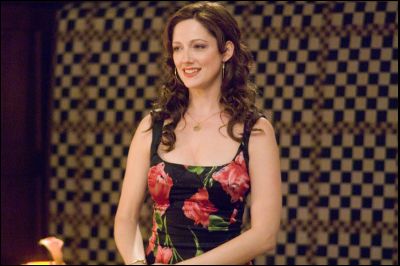 Very funny are the two foils to the two main characters. Judy Greer is Casey, Jane's best friend and work-mate, and Maulik Pancholy is Trent, Kevin's work-mate. Both are looking for easy sex. Both are encouraging their friend to use the situations (weddings) to grab a one-night-stand. Through them, the writer is offering the alternative to marriage: no-commitment selfish unrelationship.
Very funny are the two foils to the two main characters. Judy Greer is Casey, Jane's best friend and work-mate, and Maulik Pancholy is Trent, Kevin's work-mate. Both are looking for easy sex. Both are encouraging their friend to use the situations (weddings) to grab a one-night-stand. Through them, the writer is offering the alternative to marriage: no-commitment selfish unrelationship.

 When things start disappearing, Jared is blamed -- an easy target. Of course, this is a dysfunctional family, with every man for himself. At least at the start. But when Jared discovers a dumb waiter leading to a secret room, he finds Arthur Spiderwick's sealed book. On the cover is a note giving a clear warning not to open the book. But where would the movie go if Simon had found the book instead? No doubt, he would have left it unopened and gone on with life. But not Jared. He opens it unleasing a kind of sonic boom, letting every magical creature know that the book is once more found and open.
When things start disappearing, Jared is blamed -- an easy target. Of course, this is a dysfunctional family, with every man for himself. At least at the start. But when Jared discovers a dumb waiter leading to a secret room, he finds Arthur Spiderwick's sealed book. On the cover is a note giving a clear warning not to open the book. But where would the movie go if Simon had found the book instead? No doubt, he would have left it unopened and gone on with life. But not Jared. He opens it unleasing a kind of sonic boom, letting every magical creature know that the book is once more found and open. From here, the narrative goes in a straight-line, including goblins, hobgoblins, sylphs and an ogre. Unlike
From here, the narrative goes in a straight-line, including goblins, hobgoblins, sylphs and an ogre. Unlike  As the plot plods on, Jared convinces his siblings that there really are these fantastical things living in the woods with evil plans. Once convinced, these two rational siblings become followers to the emerging leadership of Jared. From angry, sullen kid to "warrior-leader" all in the space of a few minutes.
As the plot plods on, Jared convinces his siblings that there really are these fantastical things living in the woods with evil plans. Once convinced, these two rational siblings become followers to the emerging leadership of Jared. From angry, sullen kid to "warrior-leader" all in the space of a few minutes.

 With court intrigue, suitors trying to win her hand, growing romance and whispers of passion, a little gory torture and even battle-scenes on the water, this sounds like a mini-epic. In actuality it is no more than eye-candy. For sure, Elizabeth 2 looks beautiful. With sweeping dresses and colorful wigs, well made sets that enclose in rectangular frames and circular rooms that show her aspiring freedom, this is a fantastic period piece with a loud score to rule the emotions. But it is all window dressing. Though it won the 2008 Oscar for costume design, probably deservedly so, the story fails to engage. It is dull and uninspiring. The actors work hard, but the script does not give them much to work with. The dialog is trite, even stilted, and most of the characters, apart from Raleigh, not developed. Indeed, Sir Francis Drake, the real hero of the naval battle against the fearsome Spanish Armada, is not even introduced properly here.
With court intrigue, suitors trying to win her hand, growing romance and whispers of passion, a little gory torture and even battle-scenes on the water, this sounds like a mini-epic. In actuality it is no more than eye-candy. For sure, Elizabeth 2 looks beautiful. With sweeping dresses and colorful wigs, well made sets that enclose in rectangular frames and circular rooms that show her aspiring freedom, this is a fantastic period piece with a loud score to rule the emotions. But it is all window dressing. Though it won the 2008 Oscar for costume design, probably deservedly so, the story fails to engage. It is dull and uninspiring. The actors work hard, but the script does not give them much to work with. The dialog is trite, even stilted, and most of the characters, apart from Raleigh, not developed. Indeed, Sir Francis Drake, the real hero of the naval battle against the fearsome Spanish Armada, is not even introduced properly here. But this is Blanchett's movie again, and she looks good as the queen. She carries herself in a regal manner, as she did before, and rightfully got another Oscar nom. She conveys the power and anger of a ruler. In her best scene, when the Spanish ambassador to her court tells her there is a wind (war) coming, she rises to her full royal stature and declares: "I, too, can command the wind, sir! I have a hurricane in me that will strip Spain bare when you dare try me!" And we feel pity for the Spaniards for calling down her wrath upon them.
But this is Blanchett's movie again, and she looks good as the queen. She carries herself in a regal manner, as she did before, and rightfully got another Oscar nom. She conveys the power and anger of a ruler. In her best scene, when the Spanish ambassador to her court tells her there is a wind (war) coming, she rises to her full royal stature and declares: "I, too, can command the wind, sir! I have a hurricane in me that will strip Spain bare when you dare try me!" And we feel pity for the Spaniards for calling down her wrath upon them. She communicates the loneliness of a monarch. As ruler, she is powerful but is still caged by her position. As a woman she cannot find love, though her advisors, such as Walsingham (Geoffrey Rush) bring potential suitor after potential suitor into her presence.
She communicates the loneliness of a monarch. As ruler, she is powerful but is still caged by her position. As a woman she cannot find love, though her advisors, such as Walsingham (Geoffrey Rush) bring potential suitor after potential suitor into her presence.

 The movie opens with scenes of women workers of all varieties, going to work in London. When a wrinkled gray woman meets a journalist in a cafe and starts to weave a tale, it becomes clear that the story is really set in the swinging 60s. It could not work in any other decade, since the focus is on the tale-teller, Laura Quinn (Demi Moore), the only woman manager in the London Diamond Company. In earlier decades women did not work as managers. In later decades, women's liberation movements had earned a level of equality, resulting in a plethora of female managers.
The movie opens with scenes of women workers of all varieties, going to work in London. When a wrinkled gray woman meets a journalist in a cafe and starts to weave a tale, it becomes clear that the story is really set in the swinging 60s. It could not work in any other decade, since the focus is on the tale-teller, Laura Quinn (Demi Moore), the only woman manager in the London Diamond Company. In earlier decades women did not work as managers. In later decades, women's liberation movements had earned a level of equality, resulting in a plethora of female managers.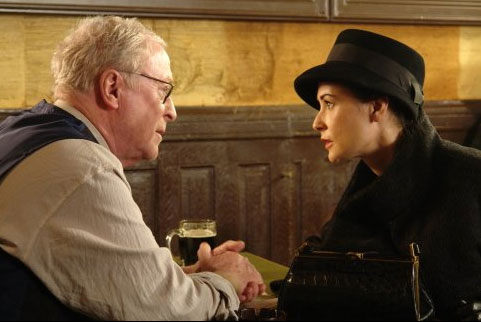 Hobbs offers her a chance to get even with the company -- together they would rob the vault. But they would steal only a handful of diamonds, a trifling amount providing perhaps a million each, since that is small enough potatoes that the company would not even notice. Even a million is a nice termination ticket. In today's money that would be 100 million or more. To entice her, he asks her what she would do with her share. Greed does sell.
Hobbs offers her a chance to get even with the company -- together they would rob the vault. But they would steal only a handful of diamonds, a trifling amount providing perhaps a million each, since that is small enough potatoes that the company would not even notice. Even a million is a nice termination ticket. In today's money that would be 100 million or more. To entice her, he asks her what she would do with her share. Greed does sell.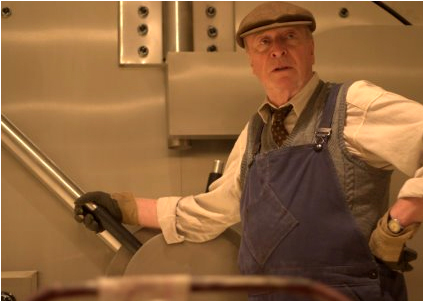 Throughout, Flawless keeps the viewer intrigued with these two questions of how and why. We know why Quinn want the money -- greed. But Hobbs is a different fish. He is an unknown character, and it is only at the climax that we understand the motive for his manipulations.
Throughout, Flawless keeps the viewer intrigued with these two questions of how and why. We know why Quinn want the money -- greed. But Hobbs is a different fish. He is an unknown character, and it is only at the climax that we understand the motive for his manipulations.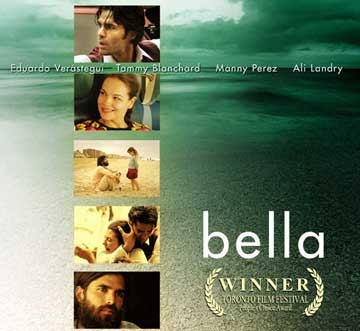

 Like
Like  A crucial scene occurs when Jose brings Nina to his family home at the beach. There they spend some time doing simple things. They plant trees with his Spanish-speaking dad, and afterwards Jose shows her his classic car, hidden away in the garage gathering dust. As they sit in this convertible beauty, she asks when he last drove it, unknowingly triggering painful unspoken memories. He opens up a secret compartment; a secret that changed his life is told, his soul is bared.
A crucial scene occurs when Jose brings Nina to his family home at the beach. There they spend some time doing simple things. They plant trees with his Spanish-speaking dad, and afterwards Jose shows her his classic car, hidden away in the garage gathering dust. As they sit in this convertible beauty, she asks when he last drove it, unknowingly triggering painful unspoken memories. He opens up a secret compartment; a secret that changed his life is told, his soul is bared. One day in New York changes the lives of the three main characters. As a chef, Jose can see the lives of his fellow cooks, and workers. He has a caring heart, but a broken spirit. His brother Manny (Manny Perez) runs the restaurant like a general, with his clipped mustache and tailored suit. He knows if his workers are 20 minutes late but not how many kids they have. And all he cares about is the money. He has a business, not a life. Meanwhile Nina has a cynicism and mistrust that permeates her being. But as Jose restores Nina's trust in humanity, so she restores his passion in life. And as he experiences life again, he shows Manny that there is more than business, there is family and relationships.
One day in New York changes the lives of the three main characters. As a chef, Jose can see the lives of his fellow cooks, and workers. He has a caring heart, but a broken spirit. His brother Manny (Manny Perez) runs the restaurant like a general, with his clipped mustache and tailored suit. He knows if his workers are 20 minutes late but not how many kids they have. And all he cares about is the money. He has a business, not a life. Meanwhile Nina has a cynicism and mistrust that permeates her being. But as Jose restores Nina's trust in humanity, so she restores his passion in life. And as he experiences life again, he shows Manny that there is more than business, there is family and relationships.

 Finally, there is the collector, Nino (Mathieu Kassovitz). At this point, he collects torn-up photos from photobooths and reconstructs them to paste them into an album. Quirky, yes; bizarre, maybe. When Nino's album falls in Amélie's hands, she discovers in the album, multiple photos of an unknown bald-headed man who frequents the booths across Paris on a regular basis, a mystery indeed.
Finally, there is the collector, Nino (Mathieu Kassovitz). At this point, he collects torn-up photos from photobooths and reconstructs them to paste them into an album. Quirky, yes; bizarre, maybe. When Nino's album falls in Amélie's hands, she discovers in the album, multiple photos of an unknown bald-headed man who frequents the booths across Paris on a regular basis, a mystery indeed. Audrey Tautou instills in Amélie a sense of innocence, even naivete, while being a sweet and smart manipulator of events and schemes. She is picture perfect as the the thin young Parisian. With a bob-cut do, her big eyes and pert nose, she is pixie-like as Amélie. To think that this role was originally meant for Emily Watson is almost unthinkable. This is Tautou's defining character.
Audrey Tautou instills in Amélie a sense of innocence, even naivete, while being a sweet and smart manipulator of events and schemes. She is picture perfect as the the thin young Parisian. With a bob-cut do, her big eyes and pert nose, she is pixie-like as Amélie. To think that this role was originally meant for Emily Watson is almost unthinkable. This is Tautou's defining character.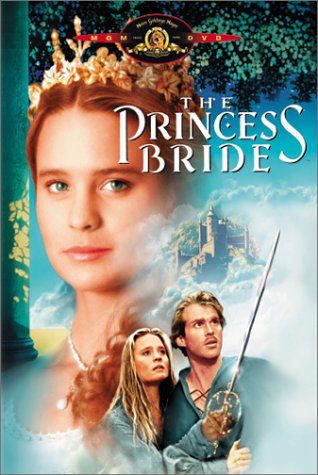

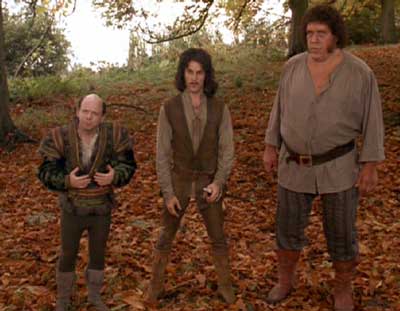 story to his sick grandson (Fred Savage in an award-winning role),
story to his sick grandson (Fred Savage in an award-winning role),  Amidst the ensuing adventures, there are several rib-tickling cameos. Mel Smith appears as an albino torturer. Billy Crystal is superb as a sacked miracle worker, Miracle Max. He is old and wizened, a cynical old wizard. When asked to bring Westley back from the dead, after he is killed in the pit of despair, Miracle Max wants money and a good reason. Only when he hears that Westley is Princess Buttercup's true love and his "resurrection" could bring humiliation and defeat to Humperdinck, does he agree. Yet, he has a strange perspective on true love: "Sonny, true love is the greatest thing, in the world-except for a nice MLT - mutton, lettuce and tomato sandwich, where the mutton is nice and lean and the tomato is ripe."
Amidst the ensuing adventures, there are several rib-tickling cameos. Mel Smith appears as an albino torturer. Billy Crystal is superb as a sacked miracle worker, Miracle Max. He is old and wizened, a cynical old wizard. When asked to bring Westley back from the dead, after he is killed in the pit of despair, Miracle Max wants money and a good reason. Only when he hears that Westley is Princess Buttercup's true love and his "resurrection" could bring humiliation and defeat to Humperdinck, does he agree. Yet, he has a strange perspective on true love: "Sonny, true love is the greatest thing, in the world-except for a nice MLT - mutton, lettuce and tomato sandwich, where the mutton is nice and lean and the tomato is ripe." Perhaps the funniest cameo of all is that of Peter Cook (former comedic partner of Dudley Moore) as the Impressive Clergyman. Employing the most impressive lisp in cinematic history, not duplicated since, he preaches a hilarious wedding sermon: "Mawage. Mawage is wot bwings us togeder tooday. Mawage, that bwessed awangment, that dweam wifin a dweam. . . . And wuv, tru wuv, will fowow you foweva." This is wet your pants laughing material.
Perhaps the funniest cameo of all is that of Peter Cook (former comedic partner of Dudley Moore) as the Impressive Clergyman. Employing the most impressive lisp in cinematic history, not duplicated since, he preaches a hilarious wedding sermon: "Mawage. Mawage is wot bwings us togeder tooday. Mawage, that bwessed awangment, that dweam wifin a dweam. . . . And wuv, tru wuv, will fowow you foweva." This is wet your pants laughing material.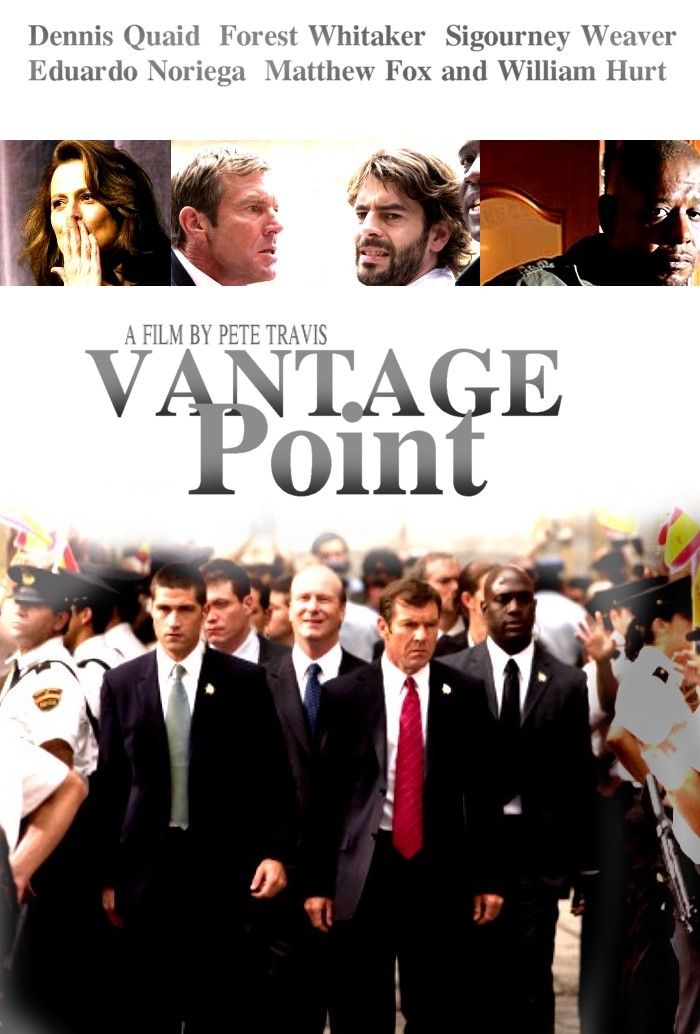
 The first view of the events is from the inside of a TV production trailer, with Rex Brooks (Sigourney Weaver) ruling her crowded roost. Watching her wall of monitors, directing the ubiquitous cameras, she sees everything that is happening as the President's motorcade approaches the plaza where he will be welcomed by the mayor. Yet, seeing everything she misses what is really happening. When President Ashton (William Hurt) arrives at the podium two shots ring out and he is taken down. When her on-site reporter is called on to give a first-hand narration, she is in tears. This has become personal. When bombs start exploding, chaos ensues, and things get even more personal and shocking.
The first view of the events is from the inside of a TV production trailer, with Rex Brooks (Sigourney Weaver) ruling her crowded roost. Watching her wall of monitors, directing the ubiquitous cameras, she sees everything that is happening as the President's motorcade approaches the plaza where he will be welcomed by the mayor. Yet, seeing everything she misses what is really happening. When President Ashton (William Hurt) arrives at the podium two shots ring out and he is taken down. When her on-site reporter is called on to give a first-hand narration, she is in tears. This has become personal. When bombs start exploding, chaos ensues, and things get even more personal and shocking.
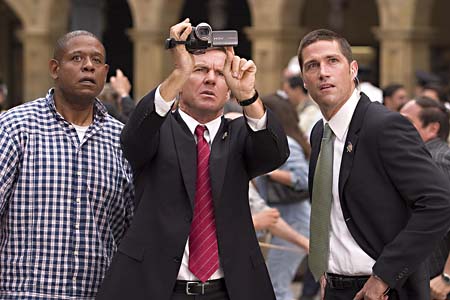 With each new take on the unfolding events we learn something new. We see through the "eyes" of Forest Whittaker's video camera. He plays a vacationing American, estranged from a wife and kids. In the midst of the Spaniards in the plaza, meeting a little girl, Anna, and slap-bang in the middle of a bomb-scene and police chase, he comes to recognize the value of life and relationships.
With each new take on the unfolding events we learn something new. We see through the "eyes" of Forest Whittaker's video camera. He plays a vacationing American, estranged from a wife and kids. In the midst of the Spaniards in the plaza, meeting a little girl, Anna, and slap-bang in the middle of a bomb-scene and police chase, he comes to recognize the value of life and relationships.

 After the annual kite-fight competition, Hassan runs after the free-flying kite whose string has been cut by Amir's kite (hence the name "kite runner"). Snagging the kite as the winner's trophy, he is chased by Assef and cornered in a dead-end alley. Threatened unless he gives up the kite, Hassan refuses. Unknown to him, Amir is watching secretly, afraid to show himself. When Assef is rebuffed, he resorts to beating and brutally raping Hassan. Throughout the ordeal, Hassan stays loyal to Amir, but Amir deserts him in his desperate hour of need.
After the annual kite-fight competition, Hassan runs after the free-flying kite whose string has been cut by Amir's kite (hence the name "kite runner"). Snagging the kite as the winner's trophy, he is chased by Assef and cornered in a dead-end alley. Threatened unless he gives up the kite, Hassan refuses. Unknown to him, Amir is watching secretly, afraid to show himself. When Assef is rebuffed, he resorts to beating and brutally raping Hassan. Throughout the ordeal, Hassan stays loyal to Amir, but Amir deserts him in his desperate hour of need. Finally Amir resorts to deception and false accusations, planting his watch in Hassan's bedroom. When confronted with theft, Hassan actually admits to it, though both he and Amir know this is untrue. Despite this moral violation, astonishingly Baba forgives him. But it is a forgiveness that Hassan's father cannot accept. In shame he takes his son and leaves the home. Amir has accomplished his desire at the cost of shaming his friend and damaging these relationships.
Finally Amir resorts to deception and false accusations, planting his watch in Hassan's bedroom. When confronted with theft, Hassan actually admits to it, though both he and Amir know this is untrue. Despite this moral violation, astonishingly Baba forgives him. But it is a forgiveness that Hassan's father cannot accept. In shame he takes his son and leaves the home. Amir has accomplished his desire at the cost of shaming his friend and damaging these relationships.

 At first, Cole and Chambers do not get along. They are from different sides of the tracks. But as Cole experiences the aftermath of brain surgery and chemo therapy, he begins to warm to the man who has family visitors.
At first, Cole and Chambers do not get along. They are from different sides of the tracks. But as Cole experiences the aftermath of brain surgery and chemo therapy, he begins to warm to the man who has family visitors. In one sense, Bucket List is a road-trip of sorts, a "travelogue journey" to accomplish life's goals, or at least the adventures one puts off in life. From sky-diving, to racing classic Mustangs on a race-track, this odd couple brings a playful chemistry to this final chapter in their lives.
In one sense, Bucket List is a road-trip of sorts, a "travelogue journey" to accomplish life's goals, or at least the adventures one puts off in life. From sky-diving, to racing classic Mustangs on a race-track, this odd couple brings a playful chemistry to this final chapter in their lives.